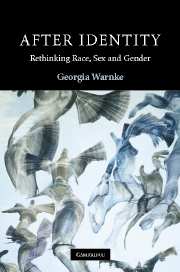Book contents
- Frontmatter
- Contents
- Acknowledgments
- Table of cases
- Introduction: reading individuals
- 1 The tragedy of David Reimer
- 2 Racial identification and identity
- 3 Race and interpretation
- 4 Sex and science
- 5 Rethinking sex and gender identities
- 6 Marriage, the military, and identity
- 7 Hermeneutics and the politics of identity
- Conclusion
- Index
1 - The tragedy of David Reimer
Published online by Cambridge University Press: 22 September 2009
- Frontmatter
- Contents
- Acknowledgments
- Table of cases
- Introduction: reading individuals
- 1 The tragedy of David Reimer
- 2 Racial identification and identity
- 3 Race and interpretation
- 4 Sex and science
- 5 Rethinking sex and gender identities
- 6 Marriage, the military, and identity
- 7 Hermeneutics and the politics of identity
- Conclusion
- Index
Summary
In 1966, at the age of eight months, Bruce Reimer and his twin brother, Brian, were admitted to the hospital for circumcisions that were meant to cure difficulties both were having in urinating. Yet Brian never underwent the procedure because Bruce's circumcision went disastrously awry. The general practitioner used an electrocautery machine to perform the procedure and something went wrong. The machine so severely burned the baby's penis that within days it dried and broke off in pieces. Unsure of what to do, Bruce's parents consulted a variety of doctors and eventually made contact with Dr. John Money at the Johns Hopkins Medical School. In addition to being a respected researcher and clinician, Money had made a name for himself as an expert in the treatment of infants born with intersexual conditions that made it unclear whether they should be brought up as girls or boys. Parents and doctors, he counseled, possessed a “degree” of freedom in deciding which sex and gender to assign to such infants, although this freedom “progressively” shrank between eighteen and thirty months and disappeared altogether at about three years. Still, as long as a definitive sex and gender assignment was made early enough in a child's life, appropriate surgical interventions could be made to shape the genitals in one way or the other; the condition could be further treated with hormones and the child could be brought up as either a girl or a boy.
- Type
- Chapter
- Information
- After IdentityRethinking Race, Sex, and Gender, pp. 15 - 48Publisher: Cambridge University PressPrint publication year: 2008

